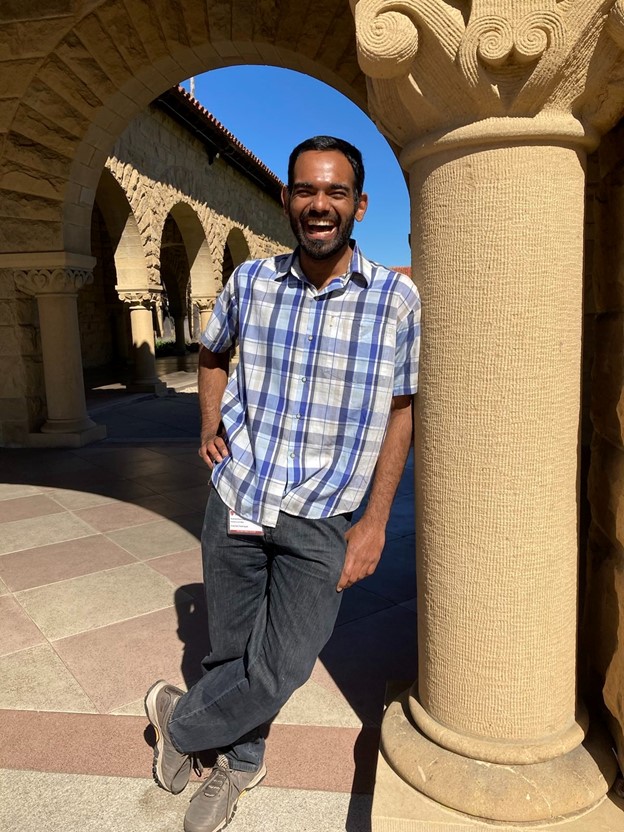 I grew up in Chennai, earned an undergraduate degree from Vivekananda College, Masterís degree from Madurai Kamaraj University, Doctoral degree in Microbiology from Cornell University, and transitioned to Stanford University to pursue further training as a postdoctoral scholar (postdoc) in October 2019.
I grew up in Chennai, earned an undergraduate degree from Vivekananda College, Masterís degree from Madurai Kamaraj University, Doctoral degree in Microbiology from Cornell University, and transitioned to Stanford University to pursue further training as a postdoctoral scholar (postdoc) in October 2019.
The transition to a postdoc was rather stressful. In the final semesters of graduate school, I was working on crucial experiments, interviewing at labs across the country, writing my dissertation, and figuring out how to pack and move to a new location. These challenges were exacerbated by being on an F1 student visa that bears constraints about transitioning out of a study program. Fortunately, support and guidance from mentors and from the Office of Global Learning at Cornell, and meticulous lists and calendars of deadlines helped navigate this complex landscape.
The interviews toward a postdoc position presented mixed emotions. As with any interview, I was anxious to perform well and be successful. I also wanted to effectively gather information about labs, colleagues, and mentors to make an informed choice at this crucial phase of my career. On the bright side, I found that my years of training as a doctoral candidate had prepared me to be an expert in my area of research, and it was incredibly fulfilling to be valued by people who interviewed me. After an extensive search for postdoc positions, I took the wonderful opportunity of working with Dr. Ami Bhattís group at the Departments of Medicine and Genetics at Stanford. Amiís group is a leader in developing and leveraging cutting edge tools in genomics and DNA sequencing to study microbes in the human gut. This presented an exciting training opportunity that would enable me to carry out impactful research. Importantly, I was attracted to this lab because Ami, and indeed every member of the lab, cared deeply about each otherís wellbeing both in the lab and beyond, and thought carefully about the value of their work to humanity with an eye towards equity and diversity in healthcare and research.
The COVID-19 pandemic was just around the corner when I started my postdoc. Come March 2020, when I had just gotten comfortable in my new lab and generated plans to carry out experiments, the campus and life at large came to a grinding halt. Given my career ambition of becoming a professor at a research university, being productive as a postdoc is critical, and all my well-laid plans went awry. Fortunately, Ami and the lab were incredibly supportive. Ami met with every member of the group to explore opportunities to continue to be productive, while also supporting our well-being in unprecedented times. Early in the pandemic, we developed an interest in a feature of COVID-19 that most people were ignoring - infected patients developed gastrointestinal symptoms like diarrhea and vomiting and shed viral RNA in their stool. These early observations combined with our well-honed skills to carefully measure microbial components in stool led us to develop a method to measure SARS-CoV-2 viral RNA in stool. In a massively collaborative effort, we leveraged this method to quantify viral RNA in stool collected from patients with mild to moderate COVID-19 infections through a clinical trial at Stanford. While I certainly had not planned for this experience, it has been an incredible journey featuring important research contributing to our understanding of COVID-19 pathobiology and disease management in real time. Importantly, the opportunity to join forces with scientists and healthcare workers around the world to address this human crisis in a small way was very fulfilling.
This experience leaves me excited to continue to pursue research!
Disclaimer:
This article was sourced by EducationUSA.
This is an unedited article. The views, thoughts, and opinions expressed in the article belong solely to the author and should not be attributed to USIEF or to the author's employer, or any organization, committee, and individual. USIEF is not responsible for any information and fact/figures therein.
